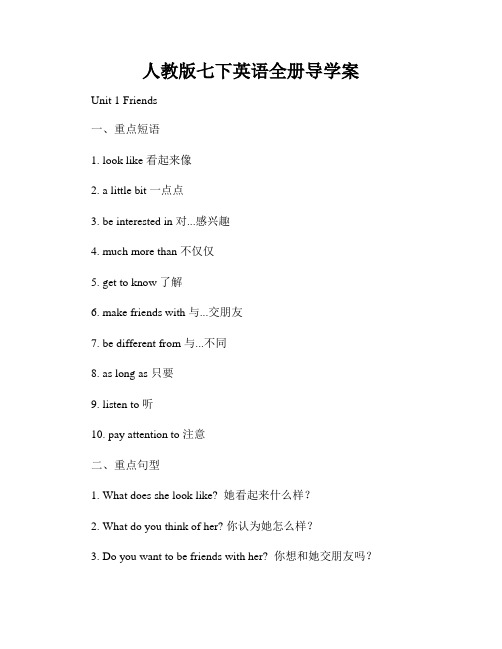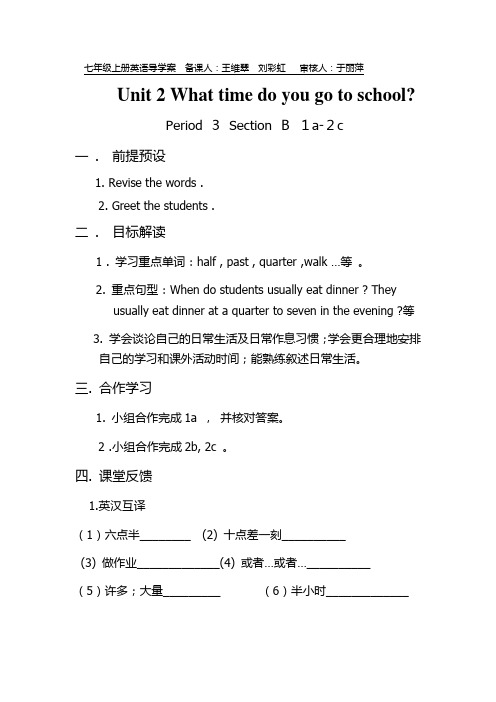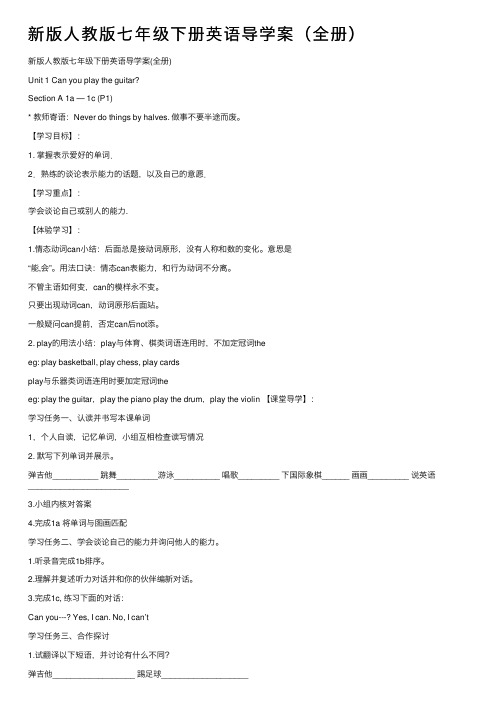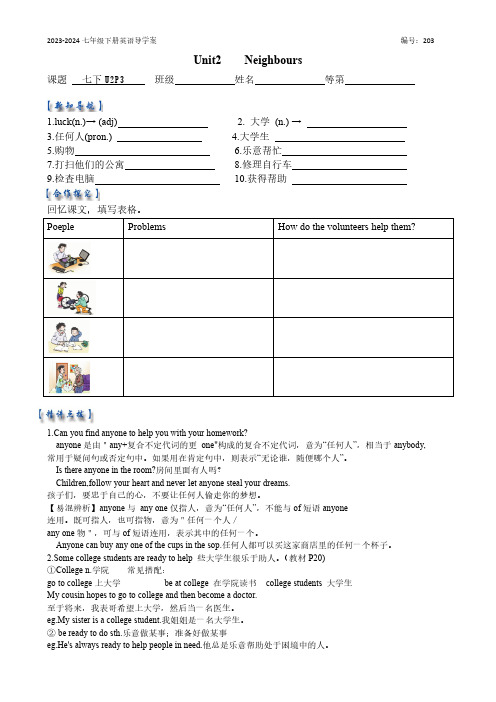2015年新人教版七下英语(精品导学案):Unit 2 -3(共8课时)
新人教版英语七年级下册导学案(全册)

新人教版英语七年级下册导学案(全册)
目标
本导学案旨在帮助学生全面复和巩固新人教版英语七年级下册的内容,提高他们的英语听说读写能力。
内容
本导学案共包含七年级下册的所有单元,每个单元的内容安排如下:
1. 单元名称: [单元名]
- 词汇: [重点词汇]
- 语法: [重点语法]
- 阅读: [阅读内容]
- 听力: [听力练]
2. ...
使用方法
1. 学生按照导学案的顺序逐个研究每个单元。
2. 针对每个单元,学生应当掌握重点词汇、重点语法,并进行阅读和听力练。
3. 学生可以按照自己的节奏进行研究,但建议每天保持一定的研究时间。
4. 完成每个单元后,学生可以进行相应的练和测试来巩固所学知识。
注意事项
1. 学生在研究过程中应保持积极的研究态度,养成良好的研究惯。
2. 学生可以在遇到困难时向老师或同学寻求帮助,但要保持独立思考和自主研究的能力。
3. 学生应合理安排研究时间,不要过度依赖导学案,应主动参与课堂和其他研究活动。
结束语
通过按照导学案进行有序的学习和复习,相信学生可以全面提升自己的英语水平,更好地应对七年级下册的学习任务。
希望学生们能够充分利用这份导学案,取得优异的成绩!加油!。
人教版七下英语全册导学案

人教版七下英语全册导学案Unit 1 Friends一、重点短语1. look like 看起来像2. a little bit 一点点3. be interested in 对...感兴趣4. much more than 不仅仅5. get to know 了解6. make friends with 与...交朋友7. be different from 与...不同8. as long as 只要9. listen to 听10. pay attention to 注意二、重点句型1. What does she look like? 她看起来什么样?2. What do you think of her? 你认为她怎么样?3. Do you want to be friends with her? 你想和她交朋友吗?4. How do you get on with your classmates? 你和你的同学相处得怎么样?5. I think she is friendly and outgoing. 我认为她友好并且外向。
6. I’m not very outgoing, but I’m very kind. 我不太外向,但是我很善良。
7. As long as she is friendly, I’m happy to make friends with her. 只要她友好,我很高兴和她交朋友。
8. He is different from me, but he gets on well with his classmates. 他和我不同,但是他和他的同学相处得很好。
9. I pay attention to my friend s’ feelings because I think it’s important. 我关注我的朋友的感受,因为我认为这很重要。
三、词汇运用1. 根据句意和首字母提示填入适当的词1) My cousin looks like her father, but she is a l_________ like her mother.2) He is very friendly and o_________. He has many friends.3) My sister is very k________ to everyone and she gets on well with her classmates.4) She is not very o________, but she is very easygoing.5) Nick is different from his brother. He is more i________ in music.2. 选择合适的词填入空格1) My friend is very _________ (outgoing, interested) in basketball and he plays it every day.2) Lucy pays a lot of attention to her _________ (families, friends) because she cares about them.3) My grandfather is very _________ (kind, similar) to all his grandchildren and he loves us very much.4) She is a little bit _________ (friendly, different) from others, but she also has many friends.5) If you want to _________(get to know, make friends) with someone, you need to be friendly and kind.Unit 2 Festivals一、重点短语1. at the beginning of 在...开始时2. send sb. sth. 向某人送去…3. in the west 在西方4. unlike sb./sth. 不同于5. look like 看起来像6. wear costumes 穿着服装7. on the 15th day of the 1st lunar month 农历正月十五8. be similar to 与...相似9. make dumplings 包饺子10. have fun 玩得开心二、重点句型1. What do people do on Mid-Autumn Festival? 中秋节的时候人们做什么?2. Are there any differences among different countries? 不同国家有什么不同之处?3. What do you think of the festival? 你觉得这个节日怎么样?4. In China, people often eat moon cakes during Mid-Autumn Festival. 在中国,中秋节的时候人们常吃月饼。
人教版七年级下册英语导学案 unit 2 p3

七年级上册英语导学案备课人:王维翠刘彩虹审核人:于丽萍Unit 2 What time do you go to school?Period 3Section B1a-2c一 . 前提预设1. Revise the words .2. Greet the students .二 . 目标解读1 . 学习重点单词:half , past , quarter ,walk …等。
2. 重点句型:When do students usually eat dinner ? Theyusually eat dinner at a quarter to seven in the evening ?等3. 学会谈论自己的日常生活及日常作息习惯;学会更合理地安排自己的学习和课外活动时间;能熟练叙述日常生活。
三. 合作学习1. 小组合作完成1a ,并核对答案。
2 .小组合作完成2b, 2c 。
四. 课堂反馈1.英汉互译(1)六点半________ (2) 十点差一刻__________(3) 做作业_____________(4) 或者…或者…__________(5)许多;大量_________ (6)半小时_____________(7)吃起来很不错__________________________(8)go to bed ____________(9)go home ______________ (10)play sports ___________(11)take a walk _________________ 2.单项选择( )(1)Peter often plays tennis _____four ____theafternoon .A .in; at B. at ; in C .at ; at( ) (2)-When do you _____school ?-I ____there at about 7:50 .A .get; getB .get to ; getC .get to ; get to( ) ( 3 ) I go to ______work after ____breakfast every day .A . / ; the B. / ; / C. the ; the( ) (4)We go to bed at a quarter _____ten .A . to B. pass C .at( ) (5)Watching TV too much isn’t good ____our health .A. toB. withC. for( ) (6)He can’t swim , I can’t ,_______.A. alsoB. tooC. either( ) (7) I want to ____a bus to the library .A. bringB. comeC. goD. take。
新版人教版七年级下册英语导学案(全册)

新版⼈教版七年级下册英语导学案(全册)新版⼈教版七年级下册英语导学案(全册)Unit 1 Can you play the guitar?Section A 1a — 1c (P1)* 教师寄语:Never do things by halves. 做事不要半途⽽废。
【学习⽬标】:1. 掌握表⽰爱好的单词.2.熟练的谈论表⽰能⼒的话题,以及⾃⼰的意愿.【学习重点】:学会谈论⾃⼰或别⼈的能⼒.【体验学习】:1.情态动词can⼩结:后⾯总是接动词原形,没有⼈称和数的变化。
意思是“能,会”。
⽤法⼝诀:情态can表能⼒,和⾏为动词不分离。
不管主语如何变,can的模样永不变。
只要出现动词can,动词原形后⾯站。
⼀般疑问can提前,否定can后not添。
2. play的⽤法⼩结:play与体育、棋类词语连⽤时,不加定冠词theeg: play basketball, play chess, play cardsplay与乐器类词语连⽤时要加定冠词theeg: play the guitar,play the piano play the drum,play the violin 【课堂导学】:学习任务⼀、认读并书写本课单词1,个⼈⾃读,记忆单词,⼩组互相检查读写情况2. 默写下列单词并展⽰。
弹吉他__________ 跳舞_________游泳__________ 唱歌_________ 下国际象棋______ 画画_________ 说英语______________________3.⼩组内核对答案4.完成1a 将单词与图画匹配学习任务⼆、学会谈论⾃⼰的能⼒并询问他⼈的能⼒。
1.听录⾳完成1b排序。
2.理解并复述听⼒对话并和你的伙伴编新对话。
3.完成1c, 练习下⾯的对话:Can you---? Yes, I can. No, I can’t学习任务三、合作探讨1.试翻译以下短语,并讨论有什么不同?弹吉他__________________ 踢⾜球___________________2.讨论如何询问第三⼈称能⼒的句型---Can he sing? ---Yes, he can. / No, he can't.---Can Tom speak English? ---Yes, he can. / No, he can't.【⾃主检测】:I.精挑细选1. Can you ________ English?A. speakB. talkC. say2. Can he __________ basketball?A. playB. playsC. playing3. My brother want _______ the chess club.A. joinB. to joinC. joins4. Mary can play the chess________ she can't swim.A. andB. orC. but5. His brother plays _______ piano every day.A. /B. aC. theII.翻译官说英语_____________ 弹吉他_____________ 象棋俱乐部__________ 下象棋______________ 英语俱乐部_____________ ⾳乐俱乐部__________ 美术俱乐部___________ 游泳俱乐部_____________ 参加___________ Ⅲ. 补全对话A. Can you ___________(唱歌)?B. Yes, I ________. Can you _________(游泳)?A. No, I want to join _______________(象棋俱乐部).B. I don't like ______________(象棋)A. What club do you want to __________?Unit 1 Can you play the guitar?Section A 2a— 2d (P2)* 教师寄语:Never do things by halves. 做事不要半途⽽废。
人教版七年级英语下册《Unit2Section A2d—3c》导学案

《Unit2Section A2d—3c》导学案课题主备人班级七年时间学习目标1.熟练掌握本课的单词,和部分短语。
2.熟练运用句型询问时间,以及在某个时间干什么事。
What's the time? It's----What time do you usually ------? I usually -----at--- 3.通过模仿3a,描述你一天的活动。
重点难点描述你的一天的活动。
学习过程一、自主学习(阅读教材8--9页完成下列各题)学法指导1、预习P8--9的单词,做到会读知意。
2、会读、会译la的短语。
3、书写要工整1、一份有趣的工作__________________电台_____________从…到…_________________有趣的时间________________我上班从不迟到_________________________在早上___________________在晚上__________________总是_______________通常___________________在周末_____________ 最好的朋友________________________ 2.关于时间的表达法——英语中表达钟点的方法一般有两种:(1)数字表达法:按照时间的顺序,用数词先说“时”,再说“分”。
如:six thirty 六点半;seven fifteen七点十五分;ninefifty-five 九点五十五分。
(2)文字表达法:先说“分”,再说“时”,中间加介词past(半点或半点以内,表示“超过”)、to(半点以上,表示“差”)。
分钟数小于等于30 分钟数+past+整点数表示几点过几分Eg 5:25 twenty-five past five8:30 half past eight3:15 a quarter past three分钟数大于30 (60-分钟数)+to +(整点数+1)表示差几分到几点Eg 1:45 a quarter to two12:55 five to one如:ten past five五点十分;a quarter past seven 七点一刻;half past nine 九点半;a quarter to twelve十二点差一刻,即十一点四十五分。
初中英语导学案(七下U2p3)

Unit2Neighbours课题七下U2P3班级姓名等第1.luck(n.)→(adj)2.大学(n.)→3.任何人(pron.)4.大学生5.购物6.乐意帮忙7.打扫他们的公寓8.修理自行车9.检查电脑10.获得帮助回忆课文,填写表格。
Poeple Problems How do the volunteers help them?1.Can you find anyone to help you with your homework?anyone是由"any+复合不定代词的更one"构成的复合不定代词,意为“任何人”,相当于anybody,常用于疑问句或否定句中。
如果用在肯定句中,则表示“无论谁,随便哪个人”。
Is there anyone in the room?房间里面有人吗?Children,follow your heart and never let anyone steal your dreams.孩子们,要忠于自己的心,不要让任何人偷走你的梦想。
【易混辨析】anyone与any one仅指人,意为“任何人”,不能与of短语anyone连用。
既可指人,也可指物,意为"任何一个人/any one物",可与of短语连用,表示其中的任何一个。
Anyone can buy any one of the cups in the sop.任何人都可以买这家商店里的任何一个杯子。
2.Some college students are ready to help些大学生很乐于助人。
(教材P20)①College n.学院常见搭配:go to college上大学be at college在学院读书college students大学生My cousin hopes to go to college and then become a doctor.至于将来,我表哥希望上大学,然后当一名医生。
人教版七年级英语下册unit2(3)导学案
本文由一线教师精心整理/word可编辑unit2(3)导学案1 / 2课题课型新授课执笔人本文由一线教师精心整理/word可编辑教研组长级部审核时间第二周第 3 导学稿审核签字教师寄语No man can do two things at once. 一心不可二用。
学习目标教学重点学会谈论自己或别人的日常生活,询问及表述时间。
教学难点在训练听说能力的基础上继续谈论人们的日常生活。
教学方法自主预习、任务型教学、合作学习教学过程do (one’s) homework, run, clean, walk, take a walkB:They usually eat dinner at a quar ter to seven in the evening.1.一半,半数______________2.晚于,过去的_______3.一刻钟,四分之一_______1. What time do you usually get up? I usually get up at five o__________.(三)预习质疑:_________________________________________________.2. 人们一般都什么时候吃晚饭?一般在晚上吃。
4. 你的哥哥几点淋浴?他经常在七点淋浴。
My _______ likes ________ dinner _______ 1:00.1:05 5:308:56 11:159:45 6:25二. 单项选择题)1. He is one of my)2. He up at six o’clock.A. get usually)3. My father always goes to bed 10 o’clock ______ night.A. at, atB. in, atC. on, /D. at, /。
人教新目标版英语七年级下册Unit1--Unit2导学案(共8课时).doc
Unit 1 Can you play the guitar?第一课时Section A (1a—2d )学习目标:1、重点单词guitar (n.) 吉他;sing (v.) 唱歌;swim(v.& n.) 游泳;dance(v.) 跳舞;draw(v.) 画画;chess(n.)国际象棋;speak (v.) 说话;说(某种语言);join(v.)加入;club(n.) 俱乐部;tell(v.) 讲述;告诉;story (n.) 故事;小说2、重点词组speak English说英语; play chess下国际象棋; play the guitar/violin弹吉他/拉小提琴 be good at擅长于…… join the chess club加入象棋俱乐部3、重点句式(1)—Can you swim?—你会游泳吗?—Yes, I c an./ No, I can’t.—是的,我会。
/不,我不会。
(2)—What can you do? 你会做什么?见到你很高兴。
—I can dance./I can’t sing.我会跳舞。
/我不会唱歌。
(3)—What club do you want to join?—你们想加入什么俱乐部?—We want to join the chess club.—我们想加入国际象棋俱乐部。
重点难点:(1)掌握动词及动词短语,例如:speak Englis h,play chess,play the piano,be good at, want to do sth.(2) 情态动词can用于询问能力的说法。
导学设计:1. Can you play the guitar? 你会弹吉他吗?【归纳】(1)can是情态动词,意为“”,表示能力,没有人称和数的变化。
can后接,它引导的疑问句常用来询问对方做某事的能力或表示请求。
(2)play意为“吹拉弹奏”,与表示西洋乐器的名词连接时,名词前要加。
2015七年级下册Unit2导学案
-你通常几点钟起床? -我通常在五点整起床。
---_____ _____ do you _______ get up? ---I usually _____ up _____ five o’clock.
二、合作与探究
1ቤተ መጻሕፍቲ ባይዱ复习、回顾数词的构成和使用。
2.时间表达法,并练习时间表达法。
课题
Unit 2 What time do you go to school?(第一课时)Section A (1a-2c)
姓名
组别
教学目标
1.知识目标:学习用when和what time引导的特殊疑问句询问时间的用法能用英语表达正确的时间。
2.技能目标:学会用频率副词谈论自己日常生活及日常作息习惯。
C.一般现在时:一般现在时:表示通常性、规律性、习惯性的状态或者动作.
在一般现在时中,当主语是第三人称单数时,谓语动词要用第三人称单数形式,即常在动词原形后加-s或-es。主语为非三单,动词用原形。例如:1.Shehaslunch at twelve.她十二点吃午餐。2. Tom and Mikelikewatching TV.
2) I usually go to bed at 10:00.(变否定句)I _____ usually _____to bed at 10:00.
3)LinHai helps his mother with the housework on Sundays.(变否定句)
LinHai _____ ______mother with the housework on Sundays.
-She usually eats breakfast _____ 7:30.
(新)人教版七年级英语下册Unit 2 period3 导学案(含答案)
预习检测
三、阅读2b短文,完成下列信息填空。
Tony
At 6:30 For lunch Sports Sleeps Eats 16.
Mary
18. Gets up
Eats fruit and hamburgers vegetables Plays basketball after Plays 19. after school lunch volleyball
思考探究
2.她不是老师,我也不是。 (3)She isn’t a teacher.I am not a teacher, either . either也有“两者其一”之意;either…or…是个 固定的搭配,意为“要么……要么……”。 (4)After class,Jane either sings or dances. 下课后,简要么唱歌要么跳舞。
目录 contents
预习检测
预习检测
一、请根据中文意思写出下列单词。(这些 都是黑体单词,要好好记住哦。) quickly 1.很快地adv.__________ sometimes 2.有时adv.______________ either 3.或者;也adv.______________ 4.有……的味道;品尝v. taste 味道;滋味n._____________ life 5.生活;生命n.______________ lot 6.大量;许多pron.___________
Goes to bed at 21.
目录 contents
思考探究
思考探究
★either和either…or…的意思及用法 also,too和either都有“也”的意思。区别: also 用于行为动词前,助动词、be动词和情态 动词后;too常用于肯定句句末;either则用于否 定句句末。 1.他是学生,我也是。 (1)He is a student. I’ m also a student. (2)He is a student.I am a student, too .
- 1、下载文档前请自行甄别文档内容的完整性,平台不提供额外的编辑、内容补充、找答案等附加服务。
- 2、"仅部分预览"的文档,不可在线预览部分如存在完整性等问题,可反馈申请退款(可完整预览的文档不适用该条件!)。
- 3、如文档侵犯您的权益,请联系客服反馈,我们会尽快为您处理(人工客服工作时间:9:00-18:30)。
Unit 2 What time do you go to school?第一课时Section A(1a-2c)【教师寄语】Knowledge is power.【Free talk】Talk about what you can do to join a club.【Learning tasks】1. 熟练掌握本课单词和短语.2. 学会谈论自己及他人的日常生活及日常作息习惯,并能合理安排.3. 掌握时间表达法.【Importance and difficulties】谈论自己及他人的日常生活及日常作息习惯.【学习过程】一、超前预习Ⅰ. 你能用英语读出下列单词和短语吗?并试着写下来(1) 单词: 时间_______淋浴,淋浴器_________通常________......点钟______(2) 短语: 几点,什么时候_____________ 去上学____________起床_________吃早饭/午饭/晚饭______________淋浴____________ 一个大家庭___________ 九点______ ___9:05 _____ _____ 12:54 ____ _____II.你能通过预习完成下面的句子吗?1. 我早上六点起床. I ______ ______ _______ six in the morning.2. 他的爸爸晚上九点洗澡.His father ______ ______ _______ ____ nine in the evening.3. 你每天早上七点跑步吗? _____ you _______ ______ seven every morning?4. 你姐姐几点吃晚饭? ______ ______ _____ your sister eat _______?5. 他的爸爸不是六点起床.His father _______ _____ ______ at six o'clock.6. Rick有一个大家庭. Rick _______ a __________.Ⅲ. 找出你的疑惑:时间的表达方式,你学会了吗?试着总结一下,好吗?____________________________________________________________________________________________________________________________二、课中学习I. 预习检测II. 解决疑惑自主互助学习知识剖析:1.get up 是一个固定词组,意为―起床‖ .相似的说法还有―be up‖.如: He gets up very early. = He is up very early.另外,get 与不同的词组搭配,还有很多固定词组.如:get back 归还,取回. get home 到家get …for 为某人拿/买get …from 从某人那得到2. go to school ―上学‖是一个固定词组,go 也有很多的固定搭配。
如:go to a movie go home go shopping3.run 是一个动词, 意为―跑‖ .run 的第三人称单数和现在分词是:runs, running. 固定搭配, run after.4. eat breakfast 吃早饭eat breakfast =have breakfast5. take a shower ―洗澡‖ ,这是一个固定词组, 其中take 可以由have 代替.take a shower= have a shower 类似的短语还有take/ have a rest take/have a walk6. do you usually go to school/ get up? 你通常何时上学/ 起床?I usually run/ She usually gets up at around 7:00.Does she usually go to school/ get up?重点难点释义:what time 和when 的区别1)询问具体的时间,两者都可以使用When do you get up? What time do you get up?2)询问钟表表示的时间只能用what timeWhat time is it now?3)询问时间段只能用whenWhen do you watch TV? I watch TV in the evening.III. 学习过程:1. 1a的图画,将词语与图片搭配,理解并复述.2. 小组为单位, 两人合作, 谈论Rick的日常生活(分别扮演Rick和采访者).3. 熟读2c中的对话,理解并复述。
4. 小组为单位, 两人合作, 谈论Rick一家的淋浴时间。
5. 小组讨论该如何表达时间?写出下列时间.9:00 ______________ 11:00 ___________10:39 _______________ 12:07 ____________ 【课堂练习】一、英汉互译。
1. 吃晚饭_________2. 淋浴;洗澡__________3. 起床_________4. eleven thirty-five _5. go to school二、用动词适当形式填空:1. Jim with me often __ ____(play)basketball after class.2. Rick`s family____ ___(take) a shower every day.3. He ____ ___(eat) rice for breakfast.4. What time __ __(do)your father eat breakfast?5. ___ ___your brother __ ___(run ) in the morning ?三、填上适当的介词.1. Jim usually get __ _____school____ __8:00 in the morning.2. We eat rice ___ ____breakfast.3. People often eat dinner ______the evening.4. What time is it________ your watch?5. Listen_________ your teacher carefully in class.6. We go to school _______Monday _____Friday.【要点归纳】1. 谈论自己及他人的日常生活及日常作息习惯。
2. 掌握时间表达法。
【拓展练习】一. 翻译词组:1. 洗澡2. 去上班3. 穿上4. 听收音机5. 做作业6. go to school7. go to bed 8. get to 9. get up10. do some washing二、句型转换。
1. He gets up at 6:30.(提问)2. The art festival is September 10th.(提问)3. goes,mother,to, usually,at,eleven, bed,my(连词成句)4. He has three baseballs. (对划线部分提问5. It's ten thirty now. (对划线部分提问三、根据汉语完成句子。
1. 我早上六点起床. I ______ ______ _______ six in the morning.2. 他的爸爸晚上九点洗澡.His father ______ ______ _______ ____ nine in the evening.3. 你每天早上七点跑步吗? _____ you _______ ______ seven every morning?4. 你姐姐几点吃晚饭? ______ ______ _____ your sister eat _______?5. 他的爸爸不是六点起床.His father _______ _____ ______ at six o''clock.6. Rick有一个大家庭. Rick _______ a __________.7. 你有多少个淋浴器?_______ _______ _________ do you have?【总结反思】U nit 2 What time do you go to school?第二课时Section A(2d-3c)【教师寄语】Interesting is the best teacher.【Free talk】Talk about what time you do something【Learning tasks】1. 熟练掌握本课的单词,和部分短语.2. 熟练运用句型询问时间,以及在某个时间干什么事What's the time? It's----What time do you usually ------? I usually -----at---3. 通过模仿3a,就你一天的活动表述成【Importance and difficulties】描述你的一天的活动。
【学习过程】一、超前预习I. 请试着写出下列短语。
工作________ 小时________ 刷________ 牙齿_________公共汽车_______ 旅馆________ 夜,夜间______ 听________家______ 早晨_________爱,喜欢_________在----之后________II. 请试着写出下列短语。
长时间___________________ 起床_______________________刷牙___________________ 冲凉,洗澡_______________________去上班___________________ 早饭后_________________整夜________________ 到家_________________看早间电视____________________ 上床睡觉_____________III. 你能通过预习说出下的句子吗?1. 几点了? 八点半__________________? _________________________.2. 汤姆通常7点半起床Tom usually ________ ________ at seven--thirty.3. 我通常八点半的时候上床睡觉I ______ go ________ bed ________ eight--thirty.4.Scott 什么时候去工作?________ ________ Scott ________ ________ ________?5.他们通常在周末锻炼。
